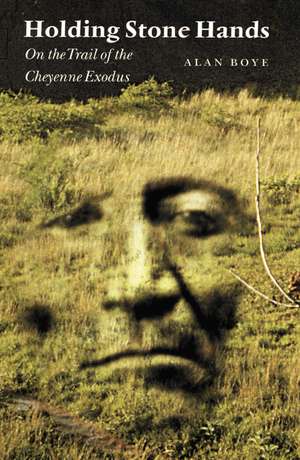Holding Stone Hands: On the Trail of the Cheyenne Exodus
Autor Alan Boye BS, MAen Limba Engleză Paperback – 31 aug 2001
In 1878 approximately three hundred Northern Cheyennes under the leadership of Dull Knife and Little Wolf fled shameful conditions on an Indian Territory reservation in present-day Oklahoma. Settled there against their will, they were making a peaceful attempt to return to their homeland in the Tongue River country of Montana. Despite earlier promises that the Cheyennes could choose to leave the reservation, government officials declared them renegades and sent thousands of soldiers in pursuit.
In 1995 Alan Boye set out on foot to follow Dull Knife's thousand-mile flight through the sparsely populated wilderness of America's high plains. Along the way he was joined by descendents of Dull Knife. Holding Stone Hands is the tale of two journeys. Boye provides a vivid, moving account of the Cheyenne's struggle to return to Montana. At the same time, he details the trek he and his Cheyenne companions made through four states and his growing understanding of why the Cheyenne's longing for their homeland was stronger than their desire to live.
Preț: 96.93 lei
Nou
Puncte Express: 145
Preț estimativ în valută:
18.56€ • 19.33$ • 15.40£
18.56€ • 19.33$ • 15.40£
Cartea se retipărește
Doresc să fiu notificat când acest titlu va fi disponibil:
Se trimite...
Preluare comenzi: 021 569.72.76
Specificații
ISBN-13: 9780803261853
ISBN-10: 0803261853
Pagini: 347
Ilustrații: Illus., map
Dimensiuni: 152 x 229 mm
Greutate: 0.45 kg
Editura: University of Nebraska Press - Bison Books
Colecția Bison Books
Locul publicării:United States
ISBN-10: 0803261853
Pagini: 347
Ilustrații: Illus., map
Dimensiuni: 152 x 229 mm
Greutate: 0.45 kg
Editura: University of Nebraska Press - Bison Books
Colecția Bison Books
Locul publicării:United States
Recenzii
"Boye and his companions follow the Cheyenne's trail, using a patchwork of highways, county roads, and open country. As Boye recounts their journey, he loops back through the history of the exodus, providing a detailed and moving narrative of the trek. More impressive still is Boye's humble, even self-effacing approach to his journey. When journalists approach the traveling party, he tries to slip into the background, knowing the true story is about the Cheyenne and their attempt to recover this faded trail and, along with it, a fuller sense of their past and present. . . . Holding Stone Hands is a Montana story through and through—perhaps one the most important ones to come along in recent years."—Montana Magazine
“There is much wisdom here to ponder. Boye reminds us that one person’s story is often like our own, and that it is in the mixture of joy and sorrow, fear and bravery, separateness and community that the truth of life is found for us all.”—Chronicles of Oklahoma
In a gracefully written and compassionate account of his return to a dark page in this country's past, Boye, who is white, relates one of the most poignant, if largely forgotten, tragedies of Native American dispossession. . . . Boye greatly enriches this story by describing his own hardships retracing the exodus through a starkly beautiful landscape, accompanied by descendants of the surviving Cheyenne. Never mawkish or patronizing, Boye recognizes early on that both journeys belong more to his companions than to himself. By reaching back and touching the suffering of their ancestors, they begin what Native Americans call 'a healing,' a reconciliation of the past with the present."—Publishers Weekly (starred review)
"Alan Boye walked a thousand miles to write Holding Stone Hands, his story about 300 Cheyenne exiled by the U.S. Army to the Indian Territory of Oklahoma in 1878, and their desperate, bloody escape across the Great Plains to their homeland in Montana."—Washington Post Book World (Experts' Picks)
"Boye has a light, winning style, even when he's writing about matters of the utmost seriousness; he introduces and explains complex points of history and anthropology with admirable ease. His prose often attains moments of real beauty, too."—Kirkus
“Boye’s spiritual awakening and inspiration are revealed in illuminating prose. The evocative emotion generated by the journey’s magnitude, its sights, and the ways in which a sense of place can put an individual in touch with touching history is profound.”—Great Plains Quarterly
Notă biografică
Alan Boye is a professor of English at Vermont's Lyndon State College. His books include A Guide to the Ghosts of Lincoln and The Complete Roadside Guide to Nebraska.
